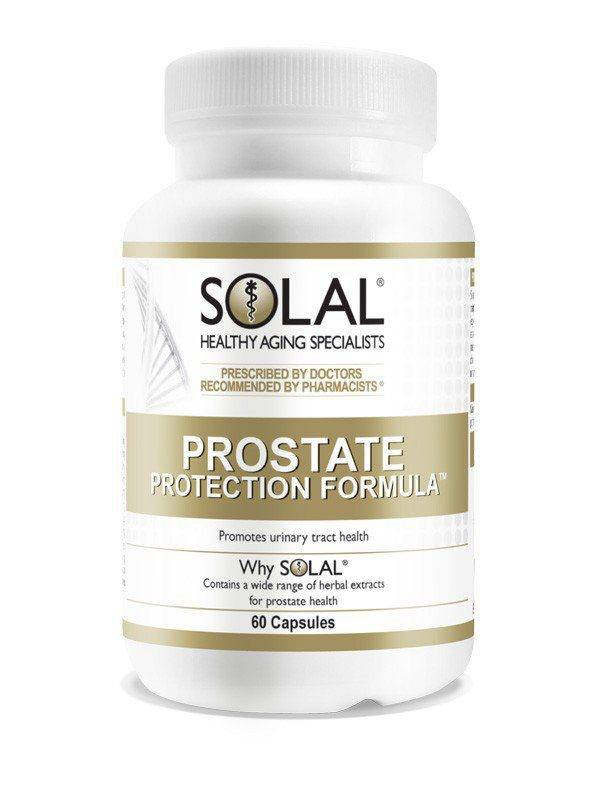Solal Prostate Protection FormulaProtects and improves symptoms of enlarged prostate. The only formulation that combines all natural extracts at the correct doses, proven to provide maximum protection for the prostate. I3C, DIM and curcumin extract protect against and may retard the growth of tumour prostate cell mutations. Beta-sitosterol improves urinary symptoms such as urinary output and bladder emptying. It also inhibits 5-alpha-reductase, thereby preventing the formation of DHT (dihydrotestosterone), a known risk factor for prostate cell mutation and growth. Lycopene and selenium reduce the risk of prostate cell mutationsProduct IndicationsI3C, DIM and curcumin extract protect against and may retard the growth of tumour prostate cell mutations. Beta-sitosterol improves urinary symptoms such as urinary output and bladder emptying. It also inhibits 5-alpha-reductase, thereby preventing the formation of DHT (dihydrotestosterone), a known risk factor for prostate cell mutation and growth. Lycopene and selenium reduce the risk of prostate cell mutations.Product CompositionEach daily dose (2 capsules) contains the following as active ingredients:
| I3C (Indole-3-Carbinol cruciferous vegetable extract) | 50mg |
| DIM (Di-Indole-Methane cruciferous extract) | 50mg |
| Curcumin extract (std to 95% curcuminoids) | 200mg |
| Beta-sitosterol | 62mg |
| Lycopene | 5mg |
| Selenium (SeSMC form) | 50µg |
| Piperine (for enhanced absorption) | 5mg |
Sugar free.Storage InstructionsStore in a cool dry place below 25°C. Keep out of the reach of children.Pharmacological ActionResearchers are interested in indole-3-carbinol and its major metabolite di-indolyl-methane (DIM) for cancer prevention, particularly prostate and colorectal cancer, because studies show diets with higher amounts of fruit and vegetable consumption are associated with a decreased risk of developing cancer. Researchers are finding that indole-3-carbinol has a variety of effects on liver metabolism of toxins. Indole-3-carbinol also induces cytochrome P450 2B1, 2B2, 3A1, and 3A2, as well as phase II enzymes including glutathione S-transferase (GST), quinone reductase, and uridine diphosphate glucuronide transferase. The phase II enzyme induction seems to have a detoxifying effect by increasing water solubility and increasing excretion of carcinogenic toxins. There is some evidence that indole-3-carbinol might have other protective effects including anti-oxidant properties. Curcumin also exhibits chemo-preventive and growth inhibitory activity against several tumour cell lines. It seems to induce apoptosis in cancer cells and may inhibit angiogenesis. For prostatic hyperplasia, animal research suggests that beta-sitosterol might inhibit 5-alpha-reductase activity, thereby reducing the conversion of testosterone to dihydrotestosterone (DHT). Increased DHT is a known risk factor for prostate cell mutation and tumour growth. Lycopene inhibits the proliferation of prostate cancer. There is also some evidence that decreased serum or tissue lycopene concentrations might increase the risk of developing prostate cancer. Lycopene seems to have some direct effects within the prostate, specifically up-regulating tumour suppressor genes. Some evidence suggests that lycopene might worsen established prostate cancer and more investigation is required. Epidemiological evidence indicates that lower blood selenium concentrations increases the likelihood of prostate cancer. Higher levels of selenium may slow prostate cancer tumour progression. Selenium seems to accumulate in the prostate, and protect against DNA damage and increase apoptosis of cancer cells. Piperine is able to increase bioavailability of many substances through a number of mechanisms. It inhibits several enzymes responsible for metabolizing nutritional substances, stimulates amino-acid transporters in the intestinal lining, inhibits removal of substances from cells so they continue to be available for use, and decreases the intestinal activity allowing more of the substances to enter the body in active form. The results of these actions are that substances reach, enter and remain within their target cells for longer periods of time than would normally be the case.Dosage DirectionsFor prostate protection and healthy prostate function, all men over 40 years of age should take 2 capsules daily. As part of treatment of a diagnosed prostate condition, two capsules twice daily can be used. Take with or shortly after meals.Product WarningsDo not exceed recommended dosages unless on the advice of a health care provider. Do not use this product if you are allergic to any of the ingredients. If you are on any medication or suffering from any medical condition, it is advisable to seek medical advice before starting any new medicine, supplement or remedy. Safety in children has not been established.Side EffectsProstate Protection Formula™ seems to be well tolerated, with rare reports of skin rash, nausea, diarrhoea and bloating being recorded.ContraindicationsThere are no known contraindications.Product InteractionsCytochrome P450 1A2: Indole-3-carbinol induces the metabolism of CYP1A2 substrates and thus lower serum concentrations. Medicines affected include clozapine, cyclobenzaprine, fluvoxamine, haloperidol, imipramine, mexiletine, olanzapine, pentazocine, propranolol, tacrine, theophylline, zileuton, zolmitriptan and others. Warfarin and anticoagulants: Concomitant use of warfarin might increase the risk of bleeding due to decreased platelet aggregation and should be avoided or carefully monitored. Some of these medicines include aspirin, clopidogrel, dalteparin, enoxaparin, heparin, ticlopidine, warfarin, and others. Ezetimibe: Ezetimibe inhibits intestinal absorption of beta-sitosterol and reduces plasma concentrations in individuals with and without sitosterolemia. In individuals with mild to moderate hypercholesterolemia, ezetimibe reduces beta-sitosterol levels by 41%. Barbiturates: Preliminary research suggests that selenium can inhibit the hepatic metabolism of barbiturates and thereby prolong the sedative effects of barbiturates in humans.Special PrecautionsBile duct obstruction and gallstones: Curcumin can cause gallbladder contractions. Use with caution in individuals with gallstones or gallbladder disease. Surgery: Curcumin has anti-platelet effects and might cause excessive bleeding perioperatively. Individuals should discontinue this product at least 2 weeks before elective surgical procedures. Prostate Cancer: There is contradictory research regarding the use of lycopene in prostate cancer. With one study reporting that lycopene might worsen established prostate cancer by increasing metastasis without having any effect on cancer cell proliferation, while other studies have found it to be beneficial. Until more is known, use lycopene in men with established prostate cancer, with caution.
